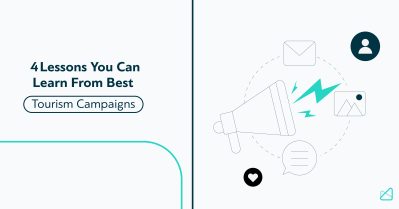Mobile Apps as the Leading Factor Transforming the Travel and Tourism Industry

Technology can transform industries and change paradigms and best practices. It appears that the travel and tourism industry is particularly susceptible to technology, especially mobile apps. It’s actually quite logical given the number of people using smartphones and mobile apps to research destinations and book trips.
In fact, a recent survey discovered that travel-based mobile apps are among the top ten most-downloaded app categories, and 60% of people plan trips using travel apps. Let’s see how the apps are transforming the travel industry and why travelers favor them over traditional ways of destination research.

How apps have transformed the travel industry
A few years ago, no one thought that anything would be able to replace online booking platforms and physical bookings. However, smartphone apps that could streamline the booking and destination research came out and enabled travelers to do everything from the comfort of their homes. The travel industry as we know it started to change.
Many offers are delivered by AI-powered mobile apps
Travelers have a lot of online platforms they can use to budget their travel, discover and compare various means of transport, plan time, and explore travel routes. While these platforms are convenient, they can’t offer personalized travel experiences.
To attract more travelers, some organizations in the travel sector started using dedicated mobile apps featuring sophisticated algorithms based on Artificial Intelligence and Machine Learning. These apps store users’ research and travel history, needs, preferences, and feedback. They use this data to recommend completely personalized trips and plan them better than any human agent.
IoT and mobile apps enabling true real-time tracking
For many tourists, time is a limited resource. Knowing exactly where they are, how fast they are going, and the accurate estimated time of arrival provides them with a sense of control. The Internet of Things combined with mobile apps is the first solution to provide all of the above.
Airlines and bus and railway companies make up a substantial sub-sector in the travel industry. They now offer mobile apps with real-time tracking capabilities. Users can finally access live information about their transport.
Relevant Geo-targeted recommendations
Many travel agencies aim to improve the guest experience while they explore their destination. That’s why they often build networks of entertainment and hospitality businesses at destinations in their offer. The only way for tourists to find out about these opportunities was via brochures and tourist brief meetings. Mobile apps are changing this forever.
Thanks to GPS, mobile apps can now provide localized recommendations and suggestions. Mobile apps also collect user data to make the suggestions even more relevant for everyone. Organizations in the travel sector use them to improve pre-arrival and post-arrival upgrade sales as well.
Making travel planning more social
Researching destinations and booking are, in essence, social interactions. Travelers read other people’s reviews and recommendations and engage in conversation with travel agents to make an informed decision. Mobile apps are transforming it by moving both research and interaction to mobile.
Instead of focusing merely on other people’s reviews and expert advice, travelers can now explore suggestions and favorites from family or friends. It helps agencies to make travel planning more social and engaging all through mobile apps.
Mobile apps improve users’ travel experience
With all the above in mind, it’s safe to say that mobile apps improve users’ travel experience across the board. There are over 6.5 billion active mobile subscriptions worldwide, and that number is projected to increase to 7.5 billion by 2025. It means that probably every traveler today uses a smartphone. Organizations in the travel sector can leverage the availability of mobile devices to deliver apps with a variety of features.
For instance, they can enable online booking, access to routes to local attractions, and deliver information about the sights in an engaging and attractive way. There are even AR-enabled mobile apps that deliver information-driven navigation and interactive experiences.
Apps are powerful marketing tools
Travel companies can also leverage mobile apps to improve their presence across two often disregarded marketing channels – Google Play Store and Apple App Store. Instead of only focusing on paid ads, review apps, and social media, they can launch their own apps for both mobile platforms.
Delivering updates consistently and adding new perks can help companies keep users engaged. It can help them not only expand the reach of their brand but also build positive relationships with travelers, become more competitive, and build a reputation as the industry leader.
Thanks to push notifications, they can keep users informed about important developments, attractive offers, and discounts.
Apps as a direct channel to users
Mobile apps deliver something that travel companies never had access to – a safe and direct channel to users. Before mobile apps, it was only possible to track customers by observing and analyzing multiple marketing and sales touchpoints. With mobile apps, travel companies can stay connected to users 24/7/365. Here are the direct benefits that come from it.
First, travel companies can leverage apps to collect usage data which helps them understand their potential customers better. They can even launch surveys to collect feedback.
The users’ usage data can also help companies assess trip budgets, requirements, and expectations for every individual user. With this data, they can offer personalized holidays to delight their app users.
Conclusion
When it comes to technology as a factor that contributes to travel industry transformation, mobile apps are among the solutions with the highest potential to push the travel sector into a new direction. The latest tech developments in ML, IoT, AI, and AR help travel companies deliver versatile apps with many different capabilities. Travel apps can help travel businesses of all sizes stay connected to their potential clients, expand their reach, and improve users’ travel experience.
Subscribe to
our newsletter
Yay! You are now
subscribed to our
newsletter
Mize is the leading hotel booking optimization solution in the world. With over 170 partners using our fintech products, Mize creates new extra profit for the hotel booking industry using its fully automated proprietary technology and has generated hundreds of millions of dollars in revenue across its suite of products for its partners. Mize was founded in 2016 with its headquarters in Tel Aviv and offices worldwide.
Related Posts

Travel Niche: What It Is, How to Leverage It, Case Studies & More
14 min. Niche travel is one of the few travel sectors that have maintained their pre-COVID market growth. By catering to specific traveler segments, niche travel developed products around adventure travel, eco-tourism, LGBTQ+ travel, and wellness retreats. Take adventure tourism as only one segment of the niche tourism market. In 2021, it reached 288 billion […]

4 Lessons You Can Learn From the Best Tourism Campaigns
13 min. Businesses in the tourism industry rely heavily on marketing to generate leads and boost conversion rates. Tourism marketing is as old as tourism itself – and it always reflects the destination and service benefits relevant to the current travelers’ needs, wants, and expectations. In other words, tourism campaigns must constantly move forward, and […]

The Vital Role of Market Segmentation in the Tourism Industry
15 min. The tourism industry is an ever-growing and competitive landscape, presenting both challenges and opportunities for businesses operating within it. This is where market segmentation comes in handy. In this blog post, we will discuss what market segmentation is, the importance of market segmentation in the tourism industry, and how online travel agencies can […]
